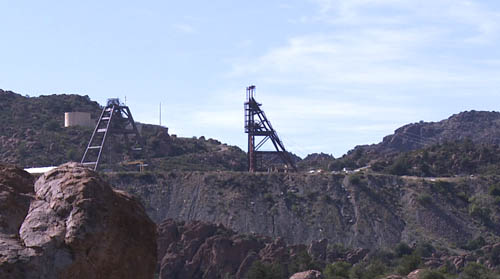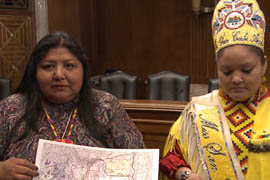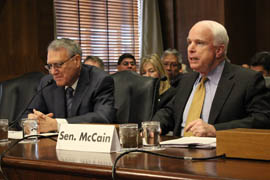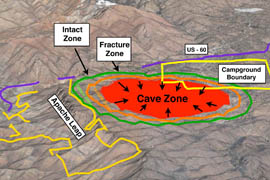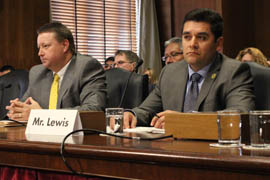Cronkite News has moved to a new home at cronkitenews.azpbs.org. Use this site to search archives from 2011 to May 2015. You can search the new site for current stories.
Senate urged not to ‘squander’ opportunity in Resolution land-swap bill
WASHINGTON – Arizona Sen. John McCain demanded Thursday that Congress approve a bill to swap thousands of acres of federal land and clear the way for a copper mine that could result in thousands of jobs in southeast Arizona.
“It’s time for Congress to put an end to these delays. The people in my state are hurting,” said McCain, who was testifying alongside fellow Arizona Sen. Jon Kyl. “This mine’s an economic opportunity that shouldn’t be squandered.”
But opponents said the proposed Resolution Copper Co. mine at Oak Flat would destroy sacred tribal land, and that federal agencies need more time to analyze the project.
“No money can replace the loss of sacred sites,” said Shan Lewis, president of the Inter Tribal Council of Arizona.
They were talking about the Southeast Arizona Land Exchange and Conservation Act of 2011, a bill that would give the federal government more than 5,300 acres of Resolution Copper land in exchange for 2,400 acres of copper–rich government land near Superior.
The House has already approved the swap. But federal agencies said more environmental impact studies need to be conducted before the government gives away the land.
McCain said the government land contains the world’s third–largest body of copper ore. Resolution wants to develop a mine there that it said could have an ultimate economic impact of billions to the state in the coming decades.
“We can get copper from this mine, Mr. Chairman, or import it from some place overseas,” McCain told the Senate Committee on Energy and Natural Resources. “There will be a continued demand for copper in our economy.”
McCain told the committee that the proposed mine would create 3,700 direct and indirect jobs and could account for a quarter of the country’s copper supply.
He criticized tribal leaders who oppose the bill, saying it is “not fair and it’s not right” that they refuse to even sit down and hear the proposal from the copper company.
“I respect tribal sovereignty,” he said. “I don’t respect people who refuse to sit down and at least listen to something that could help the tribe itself enormously economically.”
But Lewis of the Inter Tribal Council of Arizona said it’s not possible for the tribes to sit down and talk with Resolution Copper about a bill that does not call for environmental studies prior to a land swap.
“Without looking into the environmental issue that may come with this type of project … it’s hard to sit down and talk about what impacts this mining company brings,” Lewis said.
Government officials echoed those concerns. Environmental analysis “in advance of the exchange would create an opportunity for meaningful tribal consultation where tribal concerns and interests would be identified and addressed and possibly mitigated,” said Mary Wagner, associate chief of the U.S. Forest Service, in her testimony.
Officials at the hearing said they were only asking that the Resolution project get the same level of review that any other similar project get.
But Kyl implored the committee to move the bill forward and not put the project in the hands of bureaucrats who would delay it by years.
“We have always been the ultimate arbiter of what we believe is in the public’s interest and we should retain our authority to do that,” Kyl said. “We have the authority. Why can’t we make this determination?”
Resolution Copper Vice President Jon Cherry said the company cannot risk putting the project’s fate in the hands of federal agencies, as it could be delayed for years. He pointed to the nearby Asarco Mine that he said has taken 14 years to go through the bureaucratic route for a land exchange.
“Going the administrative route does not create the certainty that we need to move this project forward,” he said after the hearing.
Resolution Copper has been working on this deal since 2005 and has invested more than $750 million in the process, Cherry said.
“If you could pick a place to build a mine in the United States, you could not pick one better than right here,” he said.
But Lewis said the project threatens to contaminate water supplies, de-water nearby water sources and ruin sacred land, which is why the tribes do not support it.
“Just as a church is a special place for Christians, Oak Flat is the equivalent for Apaches, Yavapais and others,” Lewis said. “These places are holy.”

